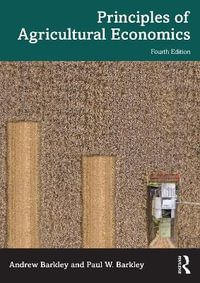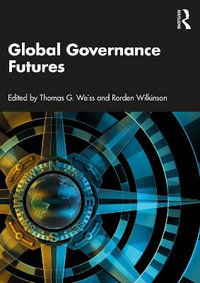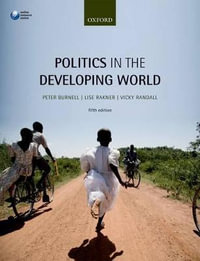"In the wake of the agricultural mobilizations of 2013 and subsequent years, and the peace accord of 2016, Felipe Roa-Clavijo's book is a timely and important contribution to the study of rural Colombia's problems and potential. It widens the focus beyond the more familiar questions of land tenure to include the renewed debate around the dilemmas, political and economic, of how Colombia should feed itself. Its relevance is far from being exclusively Colombian."
Malcolm Deas, Emeritus Fellow of Latin American Politics, St. Antony's College. University of Oxford
"We have known for a long time that power relations lie in food choices as much as in agricultural policies, but Roa-Clavijo's carefully crafted account renews our understanding of why agri-food systems with their built-in provisioning mechanisms are so deeply political. Even more importantly, Roa Clavijo's study demonstrates that, in Colombia, a focus on food provisioning (visions of how to feed whom and by what means) has enabled actors to come together as a nation. Through their negotiations, actors have worked at liberating politics from decades of land violence. One can only hope that the current commitment to inclusive politics of land, food and agriculture will facilitate the emergence of resilient and thriving local economies."
Laura M. Rival, Professor of Anthropology of Nature, Society and Development. University of Oxford
"This is a fascinating book. If you want to learn about the complex intersections of the politics of food provisioning, changes in agri-food systems and the role of social movements you must read it. Based on detailed research in Colombia, the book is an important contribution to debates in agrarian studies and wider discussions around food politics and competing pathways to sustainable development."
Ian Scoones, Professorial Fellow, STEPS Centre, the Institute of Development Studies, University of Sussex
"Lying at the heart of so many other political, economic and environmental pressures, arguably no challenge in the world is more important than equitable and sustainable food provision. At the present critical juncture, there is barely a country in the world where associated imperatives are more acute, transformations more radical, or opportunities more salient, than Colombia. Taking an interdisciplinary 'agri-food systems approach', Felipe Roa-Clavijo offers an admirably clear, comprehensive and authoritative analysis of the complex intersecting issues. His focus at the end on the importance of 'directionality', 'distribution', 'diversity' and 'democracy', offers a compelling agenda for action."
Andy Stirling, Professor of Science and Technology Policy at the Science Policy Research Unit at the University of Sussex
"This is a uniquely informed and engaging discussion of dynamics, past and present, of food-provisioning in Colombia. Importantly, it represents a significant contribution to understandings of the national agrarian strike and the emergence of new agrarian movements. A must read for anyone interested in imaging new paradigms of food and agriculture in the context of changing challenges and politics."
Jessica Duncan, Associate Professor in the Politics of Sustainable Food Systems Rural Sociology Group, Wageningen University
"In the wake of the agricultural mobilizations of 2013 and subsequent years, and the peace accord of 2016, Felipe Roa-Clavijo's book is a timely and important contribution to the study of rural Colombia's problems and potential. It widens the focus beyond the more familiar questions of land tenure to include the renewed debate around the dilemmas, political and economic, of how Colombia should feed itself. Its relevance is far from being exclusively Colombian."
Malcolm Deas, Emeritus Fellow of Latin American Politics, St. Antony's College. University of Oxford
"We have known for a long time that power relations lie in food choices as much as in agricultural policies, but Roa-Clavijo's carefully crafted account renews our understanding of why agri-food systems with their built-in provisioning mechanisms are so deeply political. Even more importantly, Roa-Clavijo's study demonstrates that, in Colombia, a focus on food provisioning (visions of how to feed whom and by what means) has enabled actors to come together as a nation. Through their negotiations, actors have worked at liberating politics from decades of land violence. One can only hope that the current commitment to inclusive politics of land, food and agriculture will facilitate the emergence of resilient and thriving local economies."
Laura M. Rival, Professor of Anthropology of Nature, Society and Development. University of Oxford
"This is a fascinating book. If you want to learn about the complex intersections of the politics of food provisioning, changes in agri-food systems and the role of social movements you must read it. Based on detailed research in Colombia, the book is an important contribution to debates in agrarian studies and wider discussions around food politics and competing pathways to sustainable development."
Ian Scoones, Professorial Fellow, STEPS Centre, the Institute of Development Studies, University of Sussex
"Lying at the heart of so many other political, economic and environmental pressures, arguably no challenge in the world is more important than equitable and sustainable food provision. At the present critical juncture, there is barely a country in the world where associated imperatives are more acute, transformations more radical, or opportunities more salient, than Colombia. Taking an interdisciplinary 'agri-food systems approach', Felipe Roa-Clavijo offers an admirably clear, comprehensive and authoritative analysis of the complex intersecting issues. His focus at the end on the importance of 'directionality', 'distribution', 'diversity' and 'democracy', offers a compelling agenda for action."
Andy Stirling, Professor of Science and Technology Policy at the Science Policy Research Unit at the University of Sussex
"This is a uniquely informed and engaging discussion of dynamics, past and present, of food-provisioning in Colombia. Importantly, it represents a significant contribution to understandings of the national agrarian strike and the emergence of new agrarian movements. A must read for anyone interested in imaging new paradigms of food and agriculture in the context of changing challenges and politics."
Jessica Duncan, Associate Professor in the Politics of Sustainable Food Systems Rural Sociology Group, Wageningen University
























